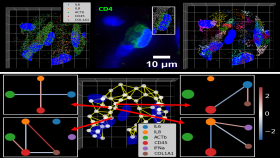ATLANTA, GA (Jan. 21, 2020) – The Wallace H. Coulter Department of Biomedical Engineering at Emory University and Georgia Tech will share in a $5.7 million Innovation Fund aimed at identifying new functional cures for children born with single ventricle heart defects, a rare but incurable condition.
Funded by the nonprofit foundation Additional Ventures, the department will join four other institutions in a large-scale coordinated research effort.
The department, a partnership between the Georgia Tech College of Engineering and the Emory University School of Medicine, will receive $1.5 million.
“This funding allows us to harness the expertise of researchers throughout Georgia Tech and Emory University to identify new interdisciplinary approaches for novel functional cures for children born with single ventricle heart defects,” says Susan Margulies, Ph.D. and chair of the Wallace H. Coulter Department of Biomedical Engineering.
“There are great discoveries happening every day in our labs. This funding will stimulate new research applications and will enable some of that promising research to reach the marketplace where it can make a difference in children’s lives.”
Single ventricle heart defects (SVDs) affect about 5 in 100,000 newborns each year and are among the most challenging and costliest heart conditions to treat. Recipients of the Innovation Fund will focus on cutting-edge research to better understand the root causes of SVDs and to develop functional cures for those living with this condition.
“Forty years ago, children with single ventricle heart defects didn’t survive past infancy,” said Erin Hoffmann, Additional Ventures president and co-founder. “While surgical advancements have vastly improved the chance of survival for these children, it also means that we must now focus on high-impact research to provide new treatment options that allow them to live long, normal lives.”
“No single lab can overcome the complex challenges of SVDs,” said Kirstie Keller, PhD, Director of Scientific Programs at Additional Ventures. “These five Innovation Funds will provide a network of researchers to collectively tackle these challenges. With rapid advances in areas like genomics, single-cell technologies and tissue engineering, now is the time to coordinate efforts to accelerate progress.”
The other recipients of the Innovation Fund are: Children’s Hospital of Philadelphia, Gladstone Institutes, The Abigail Wexner Research Institute at Nationwide Children’s Hospital, Stanford University School of Medicine and Betty Irene Moore Children’s Heart Center at Lucile Packer Children’s Hospital Stanford.
For more information on Additional Ventures and the five Innovation Funds please visit additionalventures.org.
###
About The Wallace H. Coulter Department of Biomedical Engineering
The Wallace H. Coulter Department of Biomedical Engineering is a partnership between Georgia Tech and Emory University. Combining the best of research and education, the department is dedicated to improving health and well-being by creating medical breakthroughs driven by engineering innovation and translational research. To learn more, visit: bme.gatech.edu
About Additional Ventures
Additional Ventures is a nonprofit foundation that aims to accelerate research progress and improve clinical care for children born with single ventricle heart defects (SVDs) and their families, so they can live long, healthy lives. To find more information and sign up for news updates, visit additionalventures.org.
MEDIA CONTACTS
Shannon McCaffrey
Emory University
shannon.mccaffrey@emory.edu
(404) 727-3990
Walter Rich
Georgia Tech
wrich@gatech.edu
(404) 385-2416
Media Contact
Walter Rich
Keywords
Latest BME News
Commercialization program in Coulter BME announces project teams who will receive support to get their research to market.
Courses in the Wallace H. Coulter Department of Biomedical Engineering are being reformatted to incorporate AI and machine learning so students are prepared for a data-driven biotech sector.
Influenced by her mother's journey in engineering, Sriya Surapaneni hopes to inspire other young women in the field.
Coulter BME Professor Earns Tenure, Eyes Future of Innovation in Health and Medicine
The grant will fund the development of cutting-edge technology that could detect colorectal cancer through a simple breath test
The surgical support device landed Coulter BME its 4th consecutive win for the College of Engineering competition.
New research from Georgia Tech helps doctors predict how therapies will interact with a child's immune system, potentially improving outcomes and reducing risks.








